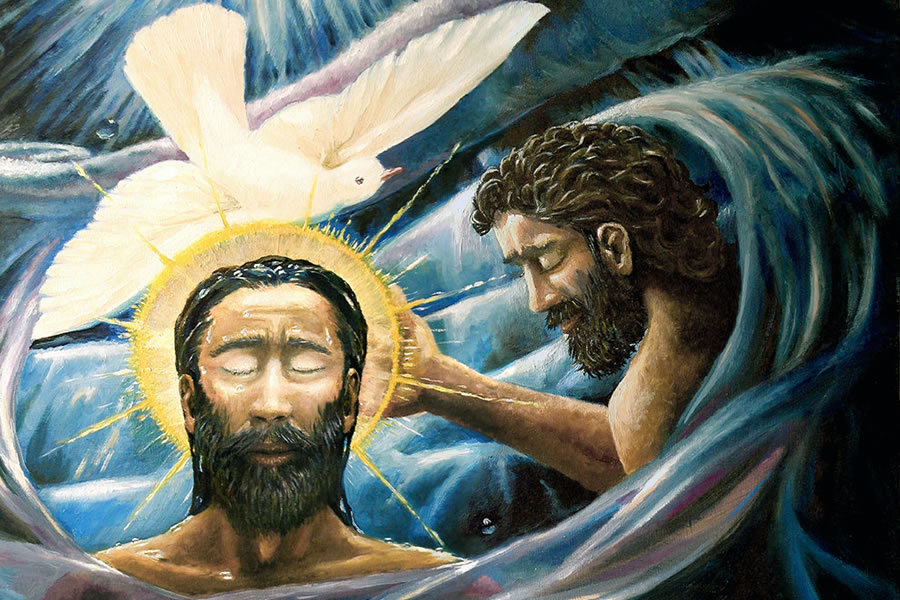Corpus Christi Blog

Marian Dogmas & Doctrine — Part 4: The Assumption
02-23-2025Weekly ReflectionJen Arnold, M.A.We have now reached the fourth Marian Dogma as defined and taught by the Magisterium of the Catholic Church — the Assumption of Mary. In a sense, the Assumption is the natural culmination of the previous three dogmas. If you accept, as the Church teaches, that Mary is the Mother of God, that her virginal purity and integrity were kept intact, and that she is the Immaculate Conception, the dogma on the Assumption is nothing less than fitting.
READ MORE
Marian Dogmas & Doctrine — Part 3: The Immaculate Conception
02-16-2025Weekly ReflectionJen Arnold, M.A.We have reached the third week of our Marian series. Today, we will have another in-depth look at the Church’s teachings about Mary as we examine the dogma of the Immaculate Conception.
It is not uncommon for people to think the Immaculate Conception refers to the conception of Jesus Christ in Mary’s womb by the Holy Spirit. That was certainly a miraculous conception, but it is not what we mean by the Immaculate Conception. Using the Magisterium as our first source of authority, on December 8, 1854, Pope Pius IX gave us a very succinct yet meaty definition of the Immaculate Conception in his apostolic constitution entitled Ineffabilis Deus, which reads:
READ MORE
Marian Dogmas & Doctrine — Part 2: Mary’s Perpetual Virginity
02-09-2025Weekly ReflectionJen Arnold, M.A.This week, we'll take a closer look at the second Marian Dogma declared by the Magisterium, which is Mary's perpetual virginity, also called her "three-fold" virginity. This dogma was confirmed at the Second Council of Constantinople in AD 553 and later pronounced by Pope Martin I at the First Lateran Council in AD 640. The term "three-fold virginity" means that Mary was a virgin before the birth of Jesus, during the birth of Jesus, and after the birth of Jesus. Let's look at what each of these terms means in more detail, as well as clarify some common questions about its teaching.
READ MORE
Marian Dogmas & Doctrine — Part 1: Mary as Theotokos
02-02-2025Weekly ReflectionJen Arnold, M.A.Today, the Church celebrates the Presentation of the Lord. According to the Jewish custom of the time, the Law of Moses required the mother to undergo ritual purification for 40 days after giving birth, completed with the sacrifice of a lamb, along with a pigeon or turtledove (cf. Lev 12). For those parents who were too poor to afford a lamb, as in Mary and Joseph’s case, an allowance was made for the sacrifice of two pigeons or two turtledoves instead. Further, all firstborn children were to be consecrated to God in a special way (Exodus 13:2). From the Presentation story, we see that Mary and Joseph cooperated in God's plan for Jesus from the beginning. In this moment, the prophet Simeon addresses Mary directly, highlighting her unique role in her Son’s life and ministry as he prophesies that a sword will pierce her soul.
READ MORE
Sacred Scripture and the Sacred Liturgy
01-26-2025Weekly ReflectionJen Arnold, M.A.On September 30, 2010, Pope Benedict XVI issued an Apostolic Exhortation entitled, Verbum Domini: The Word of God in the Life and Mission of the Church, to serve as a deep study on how Sacred Scripture is at the heart of the Church’s life and mission. The exhortation is quite an extensive document and a thorough analysis of various aspects of Scripture, such as how it reveals each of the three persons of the Trinity, how it should be interpreted and studied, its role in the life of the Church, its use for proper evangelization and catechesis, and so on. For my purposes here, I will focus on the pope’s explanation of the relationship between Sacred Scripture and the Sacred Liturgy.
READ MORE
The Four Marks of the Church
01-19-2025Weekly ReflectionJen Arnold, M.A.The Nicene Creed, which we recite at Mass every Sunday, contains a concise summary of what we believe as Catholics. Within that summary, we affirm our faith in the Church, which is defined as “One, Holy, Catholic, and Apostolic.” These four
adjectives — one, holy, catholic, and apostolic — are known as the “Four Marks of the Church.” They describe the essential qualities of the Church as it was established by Christ and as it continues to exist today. Understanding these marks can help us Catholics appreciate the nature of the Church and our place within it.

The Baptism of the Lord
01-12-2025Weekly ReflectionJen Arnold, M.A.Today, we celebrate the Baptism of the Lord, which concludes the Christmas season and transitions us into Ordinary Time. The Baptism of Jesus is one of the most significant events in the life of Christ, marking the beginning of his public ministry and providing insight into God's plan for salvation. St. John the Baptist is also a significant figure in this event, as God chose him to prepare the way for his Son's ministry and to baptize him. St. John is not simply a person who facilitates a historical event, but also a theological symbol pointing to deeper truths about repentance, salvation, and the Holy Trinity. Let's take a deeper look at the Baptism of the Lord.
READ MORE
The Holy Name of Jesus
01-05-2025Weekly ReflectionJen Arnold, M.A.A couple of days ago, on January 3, the Church celebrated the Feast of the Holy Name of Jesus, and the entire month of January is dedicated to it. The name of Jesus is not simply a name; rather, it is deeply significant in the life of the Catholic Church with theological and spiritual implications. Let's take a deeper look at the significance of the Holy Name of Jesus and why it is a source of salvation, reverence, and prayer.
READ MORE
Forge Into the Breach with St. Joseph
12-29-2024Weekly ReflectionJen Arnold, M.A.Today, we celebrate the Solemnity of the Holy Family. In the past, I have written about the Holy Family as our model of the Domestic Church, a reflection of the Holy Trinity, and an example for making our own family a school of virtue. However, this year, I would like to focus specifically on the role of men in our families using Bishop Emeritus Olmsted’s apostolic exhortation, Into the Breach, and the example of St. Joseph.
Bishop Olmsted wrote this document in 2015 and named it Into the Breach as a call to arms to Catholic men since our world, and, more specifically, our families, are under spiritual attack by Satan. Here are his opening words:
READ MORE
Advent Reflections with Blessed Pier Giorgio Frassati Part 4: Love
12-22-2024Weekly ReflectionJen Arnold, M.A.We have reached the final week of Advent, and Christmas is right around the corner. I have directed this year's Advent reflections to the youth and journeyed through each week's themes using the example of Blessed Pier Giorgio Frassati, who St. Pope John Paul II called “A Man of the Beatitudes” and a patron of the youth. The theme for this final week is charity, which is another way of saying Christian love. For this reflection, we’ll examine how Blessed Frassati demonstrated Christian love in his friendships.
READ MORE
Advent Reflections with Blessed Pier Giorgio Frassati — Part 3: Joy
12-15-2024Weekly ReflectionJen Arnold, M.A.The third Sunday of Advent is called Gaudete Sunday, which is Latin for “rejoice.” In contrast to the three purple candles, today we light the rose-colored candle on the Advent wreath as we focus on the joy we will experience with the coming of Jesus on Christmas. This week, we will look at how Blessed Pier Giorgio Frassati exemplified the virtue of joy in his young life.
READ MORE
Advent Reflections with Blessed Pier Giorgio Frassati Part 2: Peace
12-08-2024Weekly ReflectionJen Arnold, M.A.We’ve reached the second week as we continue our Advent reflections with Blessed Pier Giorgio Frassati for the youth. The theme for the second week of Advent is peace. When Pope John Paul II beatified Blessed Frassati on May 20, 1990, he called him the “Man of the Eight Beatitudes” because he lived his life according to Jesus’ roadmap to happiness in the Beatitudes (cf. Matt 5:1-12). In 1975, Pier Giorgio's sister, Luciana, wrote about her brother in a book called A Man of the Beatitudes: Pier Giorgio Frassati, in which she devoted a chapter to describing how her brother lived out each of the Beatitudes. Let's take a closer look at Luciana's perspective on her brother's living witness of the beatitude, “Blessed are the peacemakers.”
READ MORE
Advent Reflections with Blessed Pier Giorgio Frassati Part 1: Hope
12-01-2024Weekly ReflectionJen Arnold, M.A.For this Advent series, I will be reflecting on how Blessed Pier Giorgio Frassati exemplified the Advent themes of hope, peace, joy, and love. I am going to do something different for this series. While these reflections will certainly apply to anyone, my goal is to speak directly to the young people. I am currently the mother of five teenage children, so it seems a fitting time for me personally to do this. Pope John Paul II named Blessed Frassati a patron for the youth, having died at the age of 24, and Pope Francis recently announced that Frassati’s canonization will take place during the Jubilee of the Youth in Rome next summer, so he certainly is a pertinent example. If you are a parent, grandparent, or catechist, or have any young people in your life, please consider sharing these Advent reflections with them.
READ MORE